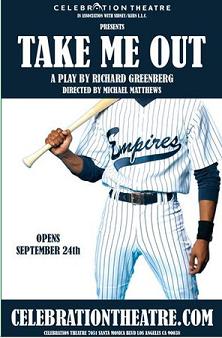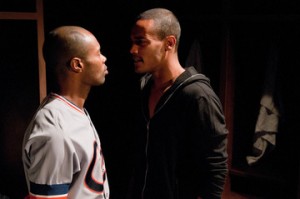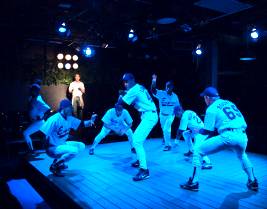
“ANOTHER THING I LIKE IS THE HOME-RUN TROT”
It is not so much that time has been unkind to Richard Greenberg’s Take Me Out but that we were perhaps too kind to it in the first place. Now, stripped of its self-importance and with enough time having elapsed since it won all its prizes and more than ready to test the waters as just another play, Michael Matthews has delivered to the Celebration Theatre one of its finest productions. Matthews’s secret is to take the play from moment to moment, find all the playfulness contained within the play, skillfully adapt it to the intimate and oddly contoured space of the theater, and people it with a cast that, together, creates a most fortuitous example of ensemble acting. At the end, it was uncertain if the heart of the play was revealed, but, as entertainment, it was a warm, funny, rousing, subtly philosophical and frequently moving evening of theater.
 This is the play about Darren Lemming, the African-American baseball hero, who, at the peak of his fame and popularity, decides to come out as a gay man to his team, his fans, and, naturally, to the world, and who, in doing so, brings out in one of his fellow players, Shane Mungitt, the ingrained racism and homophobia that is superficially buried just beneath the surface of his slow and gentle manner. This reviewer’s problem with Greenberg is not that he doesn’t write well – he is a brilliant wordsmith and his language can have the impact of a curve ball aimed directly at your heart as well as your head – but that he lacks vision: the one thing that connects one Greenberg play to another is not personal commitment but rather the niceties of style. What Matthews has done is to find in Take Me Out just exactly why it is perhaps his most successfully stylish play. He can’t totally hide the fact that too often Take Me Out looks like a musical comedy from which the songs have been extracted: there is, however, music in its soliloquies and duets and in its point-and-counterpoint, and the feeling – a rhythm all its own – that, whatever potentially tragic situation arises, it will come out all right in the end. A more serious argument could be made that his Latino ballplayers – Rodrigues and Martinez – are frankly stereotypes, but that is a worthy discussion and debate not necessarily helpful in reviewing what is right with the play, but the characters are peripheral to the action in ways that the other characters are not and that can’t be overlooked.
This is the play about Darren Lemming, the African-American baseball hero, who, at the peak of his fame and popularity, decides to come out as a gay man to his team, his fans, and, naturally, to the world, and who, in doing so, brings out in one of his fellow players, Shane Mungitt, the ingrained racism and homophobia that is superficially buried just beneath the surface of his slow and gentle manner. This reviewer’s problem with Greenberg is not that he doesn’t write well – he is a brilliant wordsmith and his language can have the impact of a curve ball aimed directly at your heart as well as your head – but that he lacks vision: the one thing that connects one Greenberg play to another is not personal commitment but rather the niceties of style. What Matthews has done is to find in Take Me Out just exactly why it is perhaps his most successfully stylish play. He can’t totally hide the fact that too often Take Me Out looks like a musical comedy from which the songs have been extracted: there is, however, music in its soliloquies and duets and in its point-and-counterpoint, and the feeling – a rhythm all its own – that, whatever potentially tragic situation arises, it will come out all right in the end. A more serious argument could be made that his Latino ballplayers – Rodrigues and Martinez – are frankly stereotypes, but that is a worthy discussion and debate not necessarily helpful in reviewing what is right with the play, but the characters are peripheral to the action in ways that the other characters are not and that can’t be overlooked.
 It is also the play with two nude shower scenes and a stylized nude fight and, while it is altogether possible that they might be considered superfluous, they are written into the script and are beautifully lit by Tim Swiss, whose work creates powerful images of physical beauty, of muscularity and male tenderness, and of the tensions that ripple through the body. When something is done this well, the question of its possible superfluity becomes redundant.
It is also the play with two nude shower scenes and a stylized nude fight and, while it is altogether possible that they might be considered superfluous, they are written into the script and are beautifully lit by Tim Swiss, whose work creates powerful images of physical beauty, of muscularity and male tenderness, and of the tensions that ripple through the body. When something is done this well, the question of its possible superfluity becomes redundant.
And, if there is a single virtue, above all others, that makes this production burn into one’s memory, it is the performance of Thomas James O’Leary as Mason Marzac, Darren’s gay accountant, whose worship of his client leads him into a feeling for baseball that would put every other fanatic’s addiction to shame. It is O’Leary’s Los Angeles stage debut – an extraordinarily auspicious debut (though he’s appeared on Broadway more than once)  – and the pleasure one gets from watching O’Leary is so acute that an easy definition of his method and style becomes near-impossible: the way he moves forward in anticipation and retreats to protect himself from humiliation, the way every word uttered from his mouth bursts forth with excitement and falls back into his throat with timid self-reproach and how they get transformed into a verbal match between the two sides of himself – encompassing certainty and uncertainty – is nothing short of astonishing. That he hits every comic note right on target without ever sacrificing the depths he has plunged into in order to give substance to his characterization is a splendid demonstration of what the best acting is most often about.
– and the pleasure one gets from watching O’Leary is so acute that an easy definition of his method and style becomes near-impossible: the way he moves forward in anticipation and retreats to protect himself from humiliation, the way every word uttered from his mouth bursts forth with excitement and falls back into his throat with timid self-reproach and how they get transformed into a verbal match between the two sides of himself – encompassing certainty and uncertainty – is nothing short of astonishing. That he hits every comic note right on target without ever sacrificing the depths he has plunged into in order to give substance to his characterization is a splendid demonstration of what the best acting is most often about.
 O’Leary gets excellent support from the entire cast but special mention goes to Garrett Matheson for making Shane Mungitt a figure of pathos even as the character reveals his ugliest side; to Tom Costello, who has an exhaustive way with language, as Darren’s closest friend on the team; to Jacques C. Smith as Darren’s African-American ally Davey Battle, whose tragic destiny is tied up with Darren’s; to Ross Cosnett and Duke Dlouhy for brief but trenchant work as fellow players. Ary Katz, as Darren, is stiff at first, but, more and more, as the character reveals the feet of clay of his god-like figure, his stiffness, like his beauty, becomes an asset, because, in essence, it is his stiffness that ultimately humanizes him.
O’Leary gets excellent support from the entire cast but special mention goes to Garrett Matheson for making Shane Mungitt a figure of pathos even as the character reveals his ugliest side; to Tom Costello, who has an exhaustive way with language, as Darren’s closest friend on the team; to Jacques C. Smith as Darren’s African-American ally Davey Battle, whose tragic destiny is tied up with Darren’s; to Ross Cosnett and Duke Dlouhy for brief but trenchant work as fellow players. Ary Katz, as Darren, is stiff at first, but, more and more, as the character reveals the feet of clay of his god-like figure, his stiffness, like his beauty, becomes an asset, because, in essence, it is his stiffness that ultimately humanizes him.
It is easier to admire Take Me Out now that is no longer full of itself. The game has been well played this time out, and it’s a winner.
harveyperr @ stageandcinema.com
photos by Michael Calas
scheduled to close October 31 at time of publication
for tickets, visit http://www.celebrationtheatre.com/onstage.html
